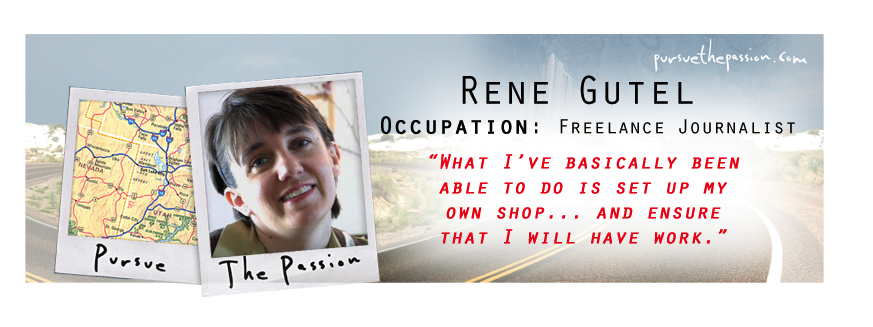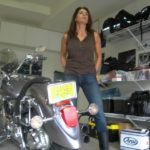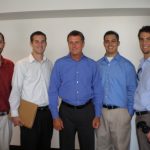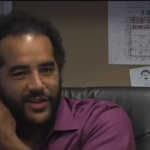
Interview: How To Become a Freelance Journalist in Public Radio
As a freelance journalist, I’m basically my own boss. I work on contract for different outlets. Occasionally I work for National Public Radio. Other times I’ll work for outlets such as World Radio Switzerland, Radio France International. It’s just all over the gamut.
I try to find my own stories. So I try to keep my ear to the ground as far as what’s happening in the community. The best resource for any journalist is their own eyes and ears. Whenever I go out, even if it’s to a social event, I read all the bulletins thinking anywhere lies a story. You never know where you might find a story.
Sometimes stories come to me. An editor will call me with a specific assignment and ask me to look into it. If something is really big, it’s obvious that I’m going to report on that.
One of the advantages of being a freelance journalist is that I am my own boss. I can pick and choose what stories I cover. So I decided that it would be really great to cover the inauguration in Washington D.C. I just cashed in on some frequent flyer miles and I’m staying with friends. I contacted people at various outlets and I was able to secure some work. So I’m going to be there for a week and a half and reporting for different outlets.
I have a lot of creative freedom. As someone who is self employed, I can decide if I’m going to work on a Saturday if I decide to take Monday off and do whatever I want. Sometimes I’ll work for two weeks straight and I’ll work through weekends. And then there’s other times when I’m really relaxed for a week and not do a lot of work. So I really, really like the freedom in both my personal life and my schedule. As well as the journalistic freedom to pick and choose what I cover.
I try to make sure that any story I produce stands alone on it’s merits. I know that there are times where I might be drawn to a particular story because I know it would be easy to get someone to buy that story. But I really want to make sure that if I’m going to spend my time reporting and researching and editing, I want to make sure it stands alone. So I only produce work that I feel very strongly about.
One thing that has been new for me has been the business side of things. As a station employee, I didn’t have to worry about invoicing and keeping track of all of my clients. I now have to have an entire program to keep track of all my payments to make sure that the check is actually going to come. So that’s been a new challenge.
There are some stories that are more challenging and have taken a lot more of my time than other stories. I was one of the few journalists…
One of the reasons why I have been successful as a freelance radio journalist is that I do have an eye for quirky, unusual story ideas. It’s probably just an extension of my personality. My public radio friends call me the ‘Queen of Quirk.’ I’m always finding just unusual interesting things to profile and feature.
I guess there’s a lot of ways to ask people difficult questions. I try to be very transparent in what I do. I don’t go for any ‘gotcha’ moments that you might see in some outlets. I’m usually just very honest with people and tell them where I’m coming from.
If I’m producing a story about someone, I want to make sure that anything I would say on the air, I would say to them face to face. I might say to them, ‘Hey, do you know that your critics say XYZ about you?’ And I give them the chance to respond. The last thing I want to do is slam someone in a story and not give them the chance to answer people’s questions.
I just try to give people the same courtesy I would want if they were interviewing me.
I really depend on my voice a lot in my work. I have to make sure that I stay healthy and strong. A radio reporter’s voice is one of their main tools. Public radio is different because we don’t try to sound news anchory. A lot of the time you’ll hear an adaptation where they try to sound like an announcer.
Public radio is all about real people and real voices. When I record a story, I try to sound like myself.
Public radio is a very compelling and intimate medium compared to any of the other media out there. It is so personal. You just have the sound of the story in your ears and that’s it. Sometimes all these images can be distracting. A TV viewer might spend more time criticizing an anchor’s tie than listening to the story. If you strip away the images and you just have the sound of the voice, I think it can lead to a more compelling story.
What I’ve been able to do is basically set up my own shop and hang up my own shingle and ensure that I will have work. And so far it’s been successful. Knock on wood.
I don’t know how to determine whether I do a good job. I want to make sure that the story is interesting and that it’s kept my attention throughout the entire process. I enjoy hearing listener feedback. People do enjoy the story and they can tell me about it. I try not to judge each individual story too much because I’ll work on a story for a week and file it. But then I need to work on the next one. So I don’t really have a whole lot of time to sit back and think whether it was a good story. But mostly, I want to make sure that it stands on it’s own journalistically. That it answers the questions that it’s trying to raise. And also that it’s accurate.
Some of the biggest obstacles in ensuring accuracy is making sure that I’m really focused. And double checking everything. Going through my script with a fine toothed comb and making sure that there aren’t any mistakes.
They say that a journalist isn’t supposed to have an opinion. I don’t think that’s fair or true. I think every journalist has an opinion. The important thing is that your opinion doesn’t end up in the story. That the opinion doesn’t end up in the conversations that you’re having with the people that you’re talking to. Because that taints the product. But if you can put your opinion in the back of your mind while you work on the story, and approach the story from all sides, that’s when I think you can do your best work.
I try to bend over backwards to see all sides of the story before putting it out there.
I never imagined I was going to be a journalist, much less a public radio journalist. I didn’t even know what National Public Radio was in high school.
I couldn’t give up the excitement of my job. Because I never know from one day to the next, one week to the next, who I’m going to interview. I’ve had the luck to interview politicians, musicians, authors, professors, so many people from different walks of life and I get to walk up to them with a microphone and ask them any question pertaining to the topic at hand.
I bring a sense of excitement and wonder to my job every day. It’s just always something new.
I’m one of these people that has a short attention span and is on the go. Journalism and radio journalism is perfect because I always have to quickly produce a story on deadline and move on to the next one.
A four minute story that I do might take a week’s time of producing it. Then I move on to the next thing. Especially as a freelancer. I don’t get a paycheck whether or not I produce. I have to produce stories, a certain amount a month in order to make the bills. It’s important for me to do hard work and find interesting people to talk to and get it done quickly and move on to the next one.
There are some stories that are less enjoyable to cover than other stories. Last month I did this piece about an eight year old boy in Arizona who was accused of murdering his father and his father’s friend. That was not a story that I really enjoyed doing. It was a really, really sad story. Anyway you looked at, from the point of view of the boy, the mother, the family of the other man who was shot, any way you looked at it the story was draining and sad and I spent a lot of time on. I was happy when I put it to bed.
I’m a freelance public radio reporter. Freelance means that I work out of my house. I work at two desks, one in the dining room. I sit there with my iPhone and make a lot of calls trying to line up interviews. My second desk is in my converted garage and guest bedroom. I set up the desk area with awards that I’ve won to make me think this is actually like an office setting. I do a lot of work here for audio editing.






